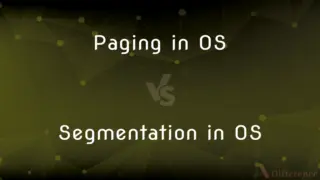Free Software vs. Freeware — What's the Difference?
By Tayyaba Rehman — Published on January 15, 2024
Free Software refers to software that grants users the freedom to use, modify, and distribute the software, while Freeware is software that is available for free, often without the freedom to modify or redistribute.

Difference Between Free Software and Freeware
Table of Contents
ADVERTISEMENT
Key Differences
Free Software is defined by its freedom for users to run, copy, distribute, study, change, and improve the software. This freedom often comes with access to the source code. Freeware, however, is simply software that's available at no cost but typically doesn't provide access to the source code or the same freedoms to modify or distribute.
The philosophy behind Free Software is focused on user freedom and community development. Users of Free Software can adapt the software to their needs and share their modifications. Freeware is more about free access than freedom; users can use the software for free, but they generally can't alter or share it.
Free Software often encourages collaborative improvement and is a cornerstone of the open-source movement. Freeware is usually proprietary; its creators retain all rights to the software, often using it as a strategy to attract users or as a lite version of paid software.
Updates and support for Free Software can come from a community of users and developers. In contrast, updates for Freeware are controlled by the original developers, and support may be limited or offered as a part of a paid service or a premium version.
Free Software can be a key component for businesses looking for customizable solutions. Freeware, while cost-effective, may not always fit specific business needs due to its non-customizable nature.
ADVERTISEMENT
Comparison Chart
Cost
Free of charge
Free of charge
Source Code Access
Usually available
Rarely available
Freedom to Modify
Allowed
Not allowed
Redistribution Rights
Permitted
Restricted or not permitted
Typical Use
Personal, educational, business
Personal, sometimes promotional
Compare with Definitions
Free Software
Promotes user freedom and control.
Free software allows users to have full control over their software.
Freeware
Typically does not offer source code access.
The freeware program did not allow for any modifications.
Free Software
Software with freedom to use, modify, and share.
Linux is a popular example of free software.
Freeware
Software available at no cost.
Many basic photo editing tools are available as freeware.
Free Software
Can be used for any purpose.
Free software can be employed in both personal and commercial environments.
Freeware
May have restrictions on commercial use.
The freeware license prohibits its use in commercial settings.
Free Software
Encourages collaborative improvement.
Free software projects often have a large community of contributors.
Freeware
Often used for promotional purposes.
Companies sometimes release freeware versions of their products for marketing.
Free Software
Often comes with accessible source code.
The source code of free software can be customized to meet specific needs.
Freeware
Updates and support controlled by developers.
Updates for this freeware are released only by the original developer.
Freeware
Software that is available for free, usually over the internet.
Freeware
(software) Complete and functional software that does not require payment or other compensation (such as viewing advertising) for its use. Freeware may be a proprietary license with no access to the source code.
Freeware
Software that is provided without charge
Common Curiosities
What is freeware?
Software available at no cost, often without modification or redistribution rights.
Can I modify freeware?
Usually not, as most freeware doesn't grant these rights.
Is freeware always free for commercial use?
Not necessarily, it depends on the license terms.
Do I get the source code with free software?
Usually, as it's a key aspect of user freedom.
Can I modify free software?
Yes, modification is a fundamental right in free software.
Do I get the source code with freeware?
Rarely, as freeware is often closed-source.
Can I redistribute freeware?
It varies, but many freeware licenses restrict redistribution.
What is free software?
Software that grants users freedoms to use, modify, and distribute.
Is free software the same as open-source software?
They share similarities, but their philosophies and focus differ slightly.
Can free software be used commercially?
Yes, it can be used for any purpose, including commercially.
Can freeware turn into paid software?
Yes, developers may offer freeware initially and later charge for it.
Can free software be distributed?
Yes, redistribution is allowed and encouraged.
Do free software programs come with support?
Support often comes from the user and developer community.
Is support available for freeware?
It depends on the developer, and it might be limited.
Why do developers release free software?
For various reasons, including community collaboration, philosophy, and transparency.
Share Your Discovery

Previous Comparison
Goals vs. Targets
Next Comparison
Paging in OS vs. Segmentation in OSAuthor Spotlight
Written by
Tayyaba RehmanTayyaba Rehman is a distinguished writer, currently serving as a primary contributor to askdifference.com. As a researcher in semantics and etymology, Tayyaba's passion for the complexity of languages and their distinctions has found a perfect home on the platform. Tayyaba delves into the intricacies of language, distinguishing between commonly confused words and phrases, thereby providing clarity for readers worldwide.











































